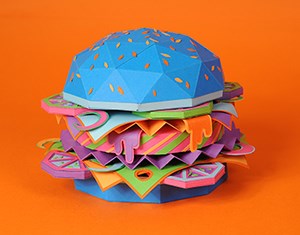Gastronomers, chefs, artists, interaction designers, graphic designers, PR professionals, food producers and others will join an open, constructive and inspiring dialogue with scientists and science communicators, to explore new ways of thinking about food sustainability and eating practices.
"Addressing the values, norms and other structures that influence dietary patterns is critical if we are to create a healthier and more sustainable food future and reach the climate goals of the Paris agreement. Together with pioneers and unconventional thinkers from different fields, we hope this event will allow us to explore new ideas on how science, art, design and gastronomy can work together to create innovative solutions", says Tara Garnett, founder of the event's main organiser, The Food Climate Research Network(FCRN), based at the Environmental Change Institute at the University of Oxford, UK.
Co-organisers are The Swedish University of Agricultural Sciences (SLU) and their research platform Future Agriculture, Dome of Visions, KTH and the Art and Science Initiative (ASI).
Media are most welcome! The seminar room is full but it is possible to come in contact with organisers and speakers during the coffee and welcome mingle at 1:30-2 pm, during the break at 4-4:30 pm and after the seminar. The seminar will be filmed and posted on the FCRN Youtube channel and Facebook.
About the event
Changing what we eat - with the help of art, design and gastronomy − Insights from 'new' disciplines in envisioning and building a more sustainable food future
Time: 12 December 2016 1:30-5:30 pm (talks starting at 2 pm)
Place: Dome of Visions, KTH Royal Institute of Technology. Main building (D and E), Valhallavägen 79, Stockholm
Language: English
Programme: Se below in this text
Contacts
Marie Persson, Food Climate Research Network (FCRN)
mariepersson@frcn.org.uk, +46 73 057 90 99
Elin Röös, Future Agriculture, Swedish University of Agricultural Sciences, elin.roos@slu.se, +46 70 305 77 10
Björn Norberg, Dome of visions
bjorn.norberg@domeofvisions.se, +46 70 088 75 35
Eliel Camargo, Art and Science Initiative (ASI)
eliel@artandscienceinitiative.org, +46 70 231 64 92
More about the programme
Speakers include
- Dr Tara Garnett, Food Climate Research Network (University of Oxford)
- Dr Elin Röös, Researcher SLU (Future Agriculture)
- Dr Line Gordon, Stockholm Resilience Center
- David Cuartielles co-founder of the Arduino platform and teacher at Malmö University
- Roberto Flore, Head of Culinary Research and Development - Nordic Food Lab (Copenhagen)
- Afton Halloran, GREEiNSECT PhD Fellow/SSHRC Doctoral Fellow (Copenhagen University)
- Malin Lobell, Artist working with the arts, culture and the environment to explore the human relation to nature and the importance of plants
- Dr Sara Ilstedt, Professor in Product and service design, KTH and Director of Green Leap.
- Dr Teo Enlund, KTH, Associate Professor in Technical Design and senior project manager Green Leap.
- Gunnar Backman, Nordisk Råvara AB (Winner of innovation agency Vinnova's competition on climate-smart protein)
Programme
1:30- 2pm Arrivals and mingling (coffee, tea and snack)
First session
2pm- 3pm: Mainstream scientific thinking - what do we know so far about what works, and what doesn't?
This session will focus on what science and social science knows so far about the need to change diets, and the scope and limitations for doing so. What do more sustainable diets look like? What interventions and mechanisms for achieving change have been tried or are possible – from shifts in regulation, to economic instruments, voluntary and other industry agreements, labelling and public awareness raising campaigns?
Why have many of these failed or been inefficient at creating the necessary shifts? What new approaches might be worth exploring? How could new disciplines and sectors (arts, design and gastronomy) help us think differently and more innovatively about the food sustainability challenge and solutions?
Second session
3pm - 3:30 pm: How have the arts and design communities been thinking about sustainability as applied to food and eating patterns?
What ideas and perspectives do they bring, focused at different spatial or community scales, to the challenge of shifting consumption patterns? (How) can design-thinking and other approaches be used to facilitate dietary change for increased sustainability?
Third session
3:30 pm - 4:00 pm: How has the gastronomy community been thinking about sustainability as applied to food and eating patterns?
What ideas and perspectives do they bring, focused at different spatial or community scales, to the challenge of shifting consumption patterns? (How) can we link food experiences/pleasure and sustainability?
4:00pm - 4.30 pm: Climate-smart protein break
Try food from Vinnova finalist Pia Qvarnström from Mögelmat AB and Swedish tempetations.
Fourth session4:30 pm - 5:30 pm: Where to go from here?
How can we create more formalised ways of working together? Why have the arts and design communities been so often excluded? How can the work and insights that these disciplines bring be truly integrated into food system sustainability work so that they are equal partners in the work, rather than acting just to visualise the results or help with outreach (at the end of the research project)? What ideas for collaborations can we think of?
